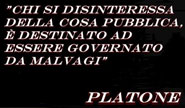Ultimo aggiornamento: venerdì, dicembre 24, 2010
CON QUESTA SECONDO ME DEVE DIMETTERSI DAL PD.
Non dovesse farlo, siccome penso che la Magistratura possa essere uno degli ultimi baluardi della legalità in questo Paese, personalmente non avrei più nulla in comune con questo partito.
ID: 160750
Date: 2008-07-03 16:54:00
Origin: 08ROME840
Source: Embassy Rome
Classification: SECRET//NOFORN
Dunno:
Destination: VZCZCXRO9503
PP RUEHFL RUEHKW RUEHLA RUEHROV
DE RUEHRO #0840/01 1851654
ZNY SSSSS ZZH
P 031654Z JUL 08
FM AMEMBASSY ROME
TO RUEHC/SECSTATE WASHDC PRIORITY 0560
INFO RUEHZL/EUROPEAN POLITICAL COLLECTIVE
RUEHFL/AMCONSUL FLORENCE 3107
RUEHMIL/AMCONSUL MILAN 9450
RUEHNP/AMCONSUL NAPLES 3254
RHEHNSC/NSC WASHDC
S E C R E T SECTION 01 OF 02 ROME 000840
SIPDIS
NOFORN
E.O. 12958: DECL: 07/02/2033
TAGS: PGOV, IT
SUBJECT: ITALY: BERLUSCONI HITS STRONG HEADWINDS
ROME 00000840 001.2 OF 002
Classified By: Ambassador Ronald P. Spogli for reasons 1.4 (b) and (d).
SUMMARY
——-
1. (C/NF) After a very strong first month in office, PM
Berlusconi’s political honeymoon has been upset by
prosecutors accelerating proceedings in criminal cases
pending against him. These proceedings, leaked wiretaps, as
well as the probability of further leaks have Berlusconi
insiders concerned. The political furor over legislative
proposals to block these investigations has distracted the
public and Italy’s politicians from progress on needed
reforms but has not reduced Berlusconi’s popularity,
according to recent opinion polls. The strong prospect that
legislation will be approved granting Berlusconi criminal
immunity by the end of July may reduce his legal risks, but
his political standing and ability to accomplish his national
agenda could suffer setbacks. END SUMMARY.
A SURPRISE CHANGE IN THE LEGISLATIVE AGENDA
——————————————-
2. (C/NF) Soon after his May 8 swearing in, PM Berlusconi
started delivering on campaign promises to reduce taxes and
increase public security, propelling his approval ratings
above sixty percent and earning him the grudging support of
many opposition voters and even parts of a normally hostile
press (REF A). On June 17, Berlusconi attached an amendment
to a security decree pending in the Senate that would freeze
trials on “lesser crimes” committed before June 30, 2002 (REF
B), a provision that would reportedly suspend at least one
case against Berlusconi. The press aggressively attacked
Berlusconi for attending to his personal affairs; Democratic
Party (PD) leader Walter Veltroni announced the end of
dialogue with Berlusconi; and several Forza Italia (FI)
members of parliament told Poloff they were confused by
Berlusconi’s timing when there was much on the political
agenda yet to be accomplished. Commentators were ready to
declare Berlusconi’s honeymoon over.
3. (C/NF) The Senate ultimately approved the amendment
freezing certain criminal cases as well as the underlying
decree, passing it the Chamber of Deputies for consideration.
The self-governing Superior Council of the Magistracy (CSM)
objected, suggesting the provision was unconstitutional.
President Napolitano gave the CSM an unusual rebuke by
telling them they were speaking out of turn and that
pronouncing on constitutionality was the purview of the
Constitutional Court. Berlusconi has since introduced a
modified version of a 2003 law, known as the “Lodo Schifani,”
that would give the top four institutional figures in Italy,
including Berlusconi, criminal immunity for the time they are
in office. Passage of at least one of these measures is
possible by the end of July. Berlusconi is also consulting
with coalition partners on a bill to restrict the use of
telephone intercepts.
4. (C/NF) Council of Ministers Undersecretary Paolo Bonaiuti
told Poloff July 1 that discussion of these provisions has
diverted the public’s attention from legislative progress on
Berlusconi’s domestic agenda. However, a poll released July
2 indicates that 51 percent of Italians would vote for
Berlusconi if elections were held now, versus 47 percent who
actually voted for him in April. 45 percent support (an
additional 10 percent are indifferent) the temporary freeze
of less important criminal cases, including those pending
against Berlusconi.
CHANGE CAUSED BY A NEWLY FULL LEGAL CASELOAD
——————————————–
5. (S/NF) The press reports there are at least three criminal
cases pending against the PM. The reason for the timing of
Berlusconi’s moves became clear when prosecutors announced
that Berlusconi could be required to testify eight times in
July. Simultaneously, audio files of wiretappings of
Berlusconi and other politicians were leaked to the press and
published on the internet. Council of Ministers
Undersecretary Gianni Letta told the Ambassador July 2 that
additional embarrassing wiretappings could be released in the
next few weeks.
6. (C/NF) Though the timing for the hearings was a surprise,
the cases against Berlusconi are not new. In one case
potentially coming to a head in the next few weeks,
Berlusconi is accused of offering British corporate lawyer
David Mills a $600,000 bribe to hide potentially
ROME 00000840 002.2 OF 002
incriminating evidence. In another trial, Berlusconi is
accused of fraud related to film rights for his private TV
network, Mediaset. In the case currently receiving the most
press due to leaked telephone intercepts, Berlusconi is
accused of trading political favors with former state
television (RAI) director Agostino Sacca, though much of the
evidence surrounds Berlusconi’s recommendations that certain
showgirls should get greater airtime. (NOTE: Berlusconi would
not be required to resign in the event of a criminal
conviction, though he would likely come under considerable
political pressure to do so. Convictions are not considered
definitive until they are upheld on two appeals. In Italy,
that can take several years. END NOTE.)
ITALY’S JUDICIARY: FOR MANY, A BROKEN SYSTEM
——————————————–
7. (C/NF) Transcripts of telephone intercepts related to
criminal investigations are frequently leaked to the press,
resulting in significant embarrassment to those involved and
calls for reform of Italy’s fiercely independent judiciary
and of the practice of wiretapping. Rarely, if ever, is the
source inside the judiciary who leaked the transcript
discovered. Though Italy’s judiciary is traditionally
considered left-leaning, former PM and FM Massimo D’Alema
told the Ambassador last year that the judiciary is the
greatest threat to the Italian state. Despite fifteen years
of discussions on the need for comprehensive judicial reform,
no significant progress has been made. Italians, by and
large, consider their judicial system broken, perhaps beyond
repair, and have very little confidence that the system
actually delivers justice.
WITH A LONG RECORD OF PURSUING BERLUSCONI
—————————————–
8. (C/NF) Berlusconi’s legal troubles date back to before his
entry into politics, though FM Frattini recently noted that
Berlusconi has never been convicted definitively for
anything. Berlusconi frequently complains that prosecutors
time the announcement of investigations to damage him
politically: “justice by the clock.” For example, Milan
judges announced they were investigating Berlusconi for
accounting fraud on April 26, 2005, the day Berlusconi was
requesting a parliamentary vote of confidence. Only a month
earlier and days before local elections, investigators
announced they would charge Berlusconi with bribery involving
film rights for his media company. Though there are several
more examples, the most celebrated is the announcement
Berlusconi was being investigated for tax fraud on the eve of
the 2001 G8 Summit in Genoa.
COMMENT
——-
9. (C/NF) Berlusconi’s legal woes have dogged his fifteen
years as a politician, though he has never received a
conclusive conviction. With even some opposition members
decrying the apparently political timing of the magistrates’
most recent investigations and supporting judicial reform, it
seems that politically motivated investigators may have gone
too far. More importantly, President Napolitano’s implied
support for a bill conferring criminal immunity on, among
others, Berlusconi means Berlusconi’s legal problems could
soon be laid to rest for the duration of his governing
mandate. Despite this and buoyant opinion polls, additional
revelations over the next month have some of his advisers
worried. In short, Berlusconi has run into headwinds, and it
is unclear if they have shifted back in his favor. In the
extreme, it is possible to imagine a scenario where
Berlusconi could lose considerable popularity and his ability
to implement reforms, or even his power to govern. END
COMMENT.
SPOGLI


 La democrazia è cultura della sobrietà, del limite e della disciplina.
La partecipazione democratica che vogliamo non è lo scatto iniziale con il quale ci si inalbera di fronte alle ingiustizie, è una condizione esistenziale permanente figlia della convivenza e madre di una ostinata responsabilità.
La democrazia è cultura della sobrietà, del limite e della disciplina.
La partecipazione democratica che vogliamo non è lo scatto iniziale con il quale ci si inalbera di fronte alle ingiustizie, è una condizione esistenziale permanente figlia della convivenza e madre di una ostinata responsabilità.


 Nefandezze nazional-persicetane
Nefandezze nazional-persicetane




